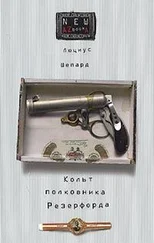Much to my relief, no call came the following morning. I thought that Billy must have checked out Pellerin and Verret, found nothing to benefit him, and hadn’t bothered getting back to me. But around ten o’clock that evening, I fielded a call from Huey Rafael, one of Billy’s people. He said that Billy wanted me to run on out to an address in Abundance Square and take charge of a situation.
“What’s up?” I asked.
“Billy says for you to get your butt over here.”
Abundance Square was in the Ninth Ward, a few blocks from the levee, and was, as far as I knew, utterly abandoned. That made me nervous.
“I’m coming,” I said. “But I’d like to know something about the situation. So I can prepare for it, you understand.”
“You ain’t need nothing to prepare you for this.” Huey’s laugh was a baritone hiccup. “Got some people want watching over. Billy say you the man for the job.”
“Who are these people?” I asked, but Huey had ended the call.
I was angry. In the past, Billy had kept a close eye on every strand of his web, but nowadays he tended to delegate authority and spent much of his time indulging his passion for reality TV. He knew more about The Amazing Race and Project Runway than he did about his business. Sooner or later, I thought, this practice was going to jump up and bite him in the ass. But as I drove toward the Ninth Ward, my natural paranoia kicked in and I began to question the wisdom of traipsing off into the middle of nowhere to hook up with a violent criminal.
Prior to Katrina, Abundance Square had been a housing project of old-style New Orleans town homes, with courtyards and balconies all painted in pastel shades. It had been completed not long before the hurricane struck. Now it was a waste of boarded-up homes and streets lined with people’s possessions. Cars, beds, lamps, bureaus, TV sets, pianos, toys, and so on, every inch of them caked with dried mud. Though I was accustomed to such sights, that night it didn’t look real. My headlights threw up bizarre images that made it appear I was driving through a post-apocalyptic version of Claymation Country. I found the address, parked a couple of blocks away, and walked back to the house. A drowned stink clotted my nostrils. In the distance, I heard sirens and industrial noise, but close at hand, it was so quiet you could hear a bug jump.
Huey answered my knock. He was a tall drink of water. Six-five, six-six, with a bluish polish to his black skin, a lean frame, pointy sideburns, and a modish goatee. He wore charcoal slacks and a high-collared camp shirt. Standing in the door, a nickel-plated .45 in hand, he might have been a bouncer at the Devil’s strip club. He preceded me toward the rear of the house, to a room lit by a kerosene lantern. At its center, one of Pellerin’s bodyguards was tied to a wooden chair. His head was slumped onto his chest, his face and shirt bloody. The air seemed to grow hotter.
I balked at entering and Huey said, “What you scared of, man? Lord Vader there ain’t going to harm you. Truth is, he gave it up quick for being a Jedi.”
“Where’s the other guy?” I asked.
“Man insisted on staying behind,” Huey said.
I had a sinking feeling, a vision of the Red House at Angola, guards strapping me down for the injection. “Jesus Christ,” I said. “You tell Billy I’m not going down for murder.”
Huey caught me by the shoulder as I turned to leave and slammed me up against the wall. He bridged his forearm under my jaw, giving me the full benefit of his lavishly applied cologne, and said, “I didn’t say a goddamn thing about murder, now did I?” When I remained silent, he asked me again and I squeezed out a no.
“I got things to take care of,” he said, stepping back. “Probably take me two, three hours. Here go.” He handed me the .45 and some keys. “You get on upstairs.”
“Who’s up there?”
“The card player and his woman. Some other guy. A doctor, he say.”
“Are they…” I searched for a word that would not excite Huey. “Uninjured?”
“Yeah, they fine.”
“And I’m supposed to keep watch, right? That’s all?”
“Billy say for you to ask some questions.”
“What about?”
“About what they up to.”
“Well, what did he tell you?” I pointed at the bodyguard. “I need something to go on.”
“Lord Vader wasn’t too clear on the subject,” said Huey. “Guess I worked him a little hard. But he did say the card player ain’t a natural man.”
Some rooms on the second floor of the townhouse were filled with stacked cots, folding tables and chairs, and with bottled water, canned food, toilet paper, and other supplies. It seemed that Billy was planning for the end times. In a room furnished with a second-hand sofa and easy chairs, I found Verret, Pellerin, and a man in his fifties with mussed gray hair and a hangdog look about the eyes. I assumed him to be Doctor Crain. He was gagged and bound to a chair. Verret and Pellerin were leg-shackled to the sofa. On seeing me, Crain arched his eyebrows and tried to speak. Pellerin glanced up from his hand of solitaire and Verret, dressed in freshly ironed jeans and a white T-shirt, gave me a sorrowful look, as if to suggest she had expected more of me.
“It’s the night shift,” Pellerin said and went back to turning over cards.
“Can you help us?” asked Verret.
“What’s up with him?” I pointed at Crain with the gun.
“He annoyed our previous keeper.” Pellerin flipped over an ace and made a satisfied noise. “He’s an annoying fellow. You’re catching him at his best.”
“Can you help us?” Verret asked again, with emphasis.
“Probably not.” I pulled a chair around and sat opposite the two of them. “But if you tell me what’s going on with you, what’s the relationship between the Darden Corporation and Tulane, the Ezawa project… I’ll try to help.”
Pellerin kept dealing, Verret gave no response, and Crain struggled with his bonds.
“Do you know where you are?” I asked. “Let me you clue you in.”
I told them who had ordered their kidnapping, mentioning the Alice Delvecchio incident along with a couple of others, then reiterated that I could probably be of no help to them—I was an unwilling participant in the process. I was sorry things had reached this pass, but if I was going to be any help at all, they ought to tell me what was up; otherwise, I couldn’t advise them on how to survive Billy Pitch.
Verret looked to Pellerin, who said, “He ain’t that damn sorry. Except where his own sorry ass is concerned.”
“Is he telling the truth?” she asked.
“More or less.”
Crain redoubled his efforts to escape, forcing muted shouts through his gag.
“I guess that’s why you’re so expert at the tables,” I said to Pellerin. “You’re good at reading people.”
“You have no idea, Small Time,” he said.
I wiggled the gun. “You’re not in a position to be giving me attitude.”
“You going to shoot me?” He gave a sneering laugh. “I don’t think so. You’re about ready to piss yourself just hanging onto that thing.”
“Josey!” Verret started to stand, then remembered the shackles. “I’ll tell you,” she said to me. “But I’d rather do it in private.”
Crain threw a conniption fit, heaving himself about in his chair, attempting to spit out his gag.
“You see,” she said. “He’s going to act like that every time I tell you something. I have to use the restroom, anyway.”
I undid the shackles, then I locked Crain and Pellerin in and escorted her down the hall, lagging behind a step so I could check out her butt. When she had finished in the john, we went into one of the storerooms. I set up a couple of folding chairs and we sat facing one another.
Читать дальше






